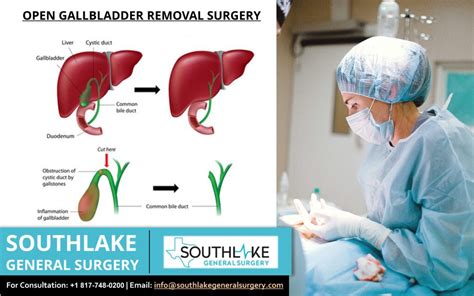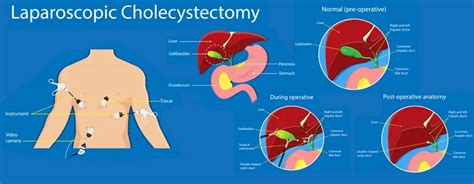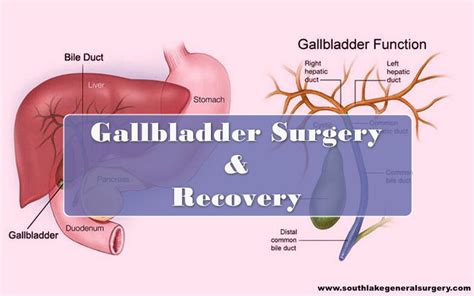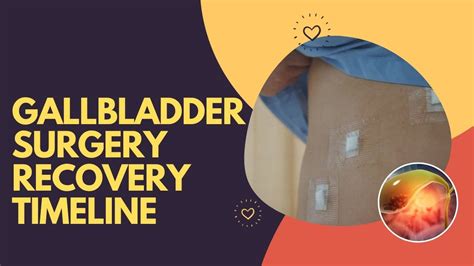Intro
Discover the typical Gallbladder Surgery Recovery Time, including post-operative care, diet, and lifestyle adjustments to ensure a smooth healing process and minimize complications after cholecystectomy.
The gallbladder is a vital organ located under the liver, responsible for storing bile, a digestive fluid produced by the liver. However, in some cases, the gallbladder may become inflamed or infected, leading to the formation of gallstones, which can cause severe pain and discomfort. When medication and other treatments fail to alleviate the symptoms, gallbladder surgery, also known as cholecystectomy, may be necessary. The primary concern for patients undergoing gallbladder surgery is the recovery time, as it can significantly impact their daily lives and overall well-being.
Gallbladder surgery recovery time is a critical aspect of the treatment process, as it determines how soon patients can return to their normal activities, work, and daily routines. The recovery period can vary depending on the type of surgery performed, the patient's overall health, and the presence of any underlying medical conditions. Generally, patients who undergo laparoscopic gallbladder surgery, a minimally invasive procedure, tend to recover faster than those who undergo open surgery. Understanding the recovery process and what to expect during this time can help patients prepare and make a smoother transition back to their normal lives.
The importance of gallbladder surgery recovery time cannot be overstated, as it plays a significant role in determining the patient's quality of life during the post-operative period. A speedy and uncomplicated recovery can reduce the risk of complications, minimize scarring, and enable patients to resume their daily activities sooner. Moreover, a well-planned recovery strategy can help patients manage their symptoms, reduce discomfort, and prevent potential complications, such as infection, bleeding, or bowel obstruction. By understanding the factors that influence gallbladder surgery recovery time, patients can take proactive steps to ensure a smooth and successful recovery.
Gallbladder Surgery Types and Recovery Time

There are two primary types of gallbladder surgery: open cholecystectomy and laparoscopic cholecystectomy. Open cholecystectomy is a traditional surgical procedure that involves making a large incision in the abdomen to remove the gallbladder. This type of surgery typically requires a longer recovery time, as the incision site needs time to heal, and patients may experience more post-operative pain and discomfort. Laparoscopic cholecystectomy, on the other hand, is a minimally invasive procedure that involves making several small incisions in the abdomen, through which a laparoscope and surgical instruments are inserted to remove the gallbladder. This type of surgery generally results in a faster recovery time, as the smaller incisions cause less tissue damage and trauma.
Open Cholecystectomy Recovery Time
The recovery time for open cholecystectomy can vary depending on the patient's overall health and the presence of any underlying medical conditions. Generally, patients who undergo open cholecystectomy can expect to spend several days in the hospital, typically 2-5 days, to recover from the surgery. During this time, patients will receive pain management medication, and their vital signs will be closely monitored to prevent any potential complications. After discharge from the hospital, patients can expect to take several weeks, typically 4-6 weeks, to fully recover from the surgery. During this time, patients should avoid heavy lifting, bending, or strenuous activities, as these can put pressure on the incision site and delay the healing process.Laparoscopic Cholecystectomy Recovery Time

The recovery time for laparoscopic cholecystectomy is generally faster than open cholecystectomy. Patients who undergo laparoscopic cholecystectomy can typically expect to spend only one day in the hospital, and some may even be discharged on the same day as the surgery. After discharge, patients can expect to take several days to a week to fully recover from the surgery. During this time, patients can gradually return to their normal activities, including work, exercise, and other daily routines. However, patients should still avoid heavy lifting, bending, or strenuous activities for several weeks to allow the incision sites to heal properly.
Factors Influencing Gallbladder Surgery Recovery Time
Several factors can influence gallbladder surgery recovery time, including the patient's overall health, age, and the presence of any underlying medical conditions. Patients with pre-existing medical conditions, such as diabetes, heart disease, or respiratory disease, may require a longer recovery time due to the increased risk of complications. Additionally, patients who are overweight or obese may experience a longer recovery time due to the increased risk of wound infection and other complications. Smoking can also delay the healing process, as it reduces blood flow to the incision site and increases the risk of complications.Gallbladder Surgery Recovery Tips

To ensure a smooth and successful recovery, patients should follow several tips, including:
- Getting plenty of rest and avoiding strenuous activities
- Eating a healthy and balanced diet to promote healing
- Avoiding heavy lifting, bending, or straining
- Taking pain management medication as directed
- Attending follow-up appointments with the surgeon
- Monitoring the incision site for signs of infection, such as redness, swelling, or discharge
Common Complications and Risks
While gallbladder surgery is generally a safe and effective procedure, there are potential complications and risks associated with the surgery. Common complications include: * Infection * Bleeding * Bowel obstruction * Adhesive bowel obstruction * Wound complicationsPatients should be aware of these potential complications and risks and seek medical attention immediately if they experience any unusual symptoms, such as severe pain, fever, or difficulty breathing.
Life After Gallbladder Surgery

After gallbladder surgery, patients can expect to make a full recovery and return to their normal activities. However, patients may need to make some lifestyle changes to ensure a smooth transition. These changes may include:
- Eating a healthy and balanced diet to promote digestion
- Avoiding fatty or greasy foods
- Drinking plenty of water to stay hydrated
- Exercising regularly to promote overall health and well-being
By following these tips and making the necessary lifestyle changes, patients can reduce the risk of complications and ensure a smooth and successful recovery.
Diet and Nutrition After Gallbladder Surgery
A healthy and balanced diet is essential for promoting digestion and reducing the risk of complications after gallbladder surgery. Patients should focus on eating: * Lean proteins, such as chicken, fish, and turkey * Whole grains, such as brown rice, quinoa, and whole wheat bread * Fresh fruits and vegetables * Low-fat dairy productsPatients should avoid eating fatty or greasy foods, as these can be difficult to digest and may cause discomfort.
Gallbladder Surgery Recovery Timeline

The recovery timeline for gallbladder surgery can vary depending on the type of surgery and the patient's overall health. Generally, patients can expect to follow this recovery timeline:
- Day 1-2: Hospitalization and recovery from anesthesia
- Day 3-7: Gradual return to normal activities, including work and exercise
- Week 1-2: Avoiding heavy lifting, bending, or strenuous activities
- Week 3-4: Gradually increasing physical activity and exercise
- Week 5-6: Returning to normal activities, including heavy lifting and bending
By following this recovery timeline and making the necessary lifestyle changes, patients can ensure a smooth and successful recovery.
Conclusion and Final Thoughts
Gallbladder surgery recovery time is a critical aspect of the treatment process, as it determines how soon patients can return to their normal activities and daily routines. By understanding the factors that influence recovery time, following recovery tips, and making the necessary lifestyle changes, patients can reduce the risk of complications and ensure a smooth and successful recovery. If you have any questions or concerns about gallbladder surgery or recovery, be sure to speak with your surgeon or healthcare provider.What is the average recovery time for gallbladder surgery?
+The average recovery time for gallbladder surgery can vary depending on the type of surgery and the patient's overall health. Generally, patients can expect to take several weeks to fully recover from the surgery.
What are the potential complications and risks associated with gallbladder surgery?
+Common complications and risks associated with gallbladder surgery include infection, bleeding, bowel obstruction, adhesive bowel obstruction, and wound complications.
How can I promote a smooth and successful recovery after gallbladder surgery?
+To promote a smooth and successful recovery, patients should follow recovery tips, such as getting plenty of rest, eating a healthy and balanced diet, avoiding heavy lifting or bending, and taking pain management medication as directed.
We hope this article has provided you with valuable information and insights into gallbladder surgery recovery time. If you have any further questions or concerns, please do not hesitate to reach out to us. We encourage you to share this article with others who may be experiencing similar health concerns, and we look forward to helping you on your journey to optimal health and well-being.
